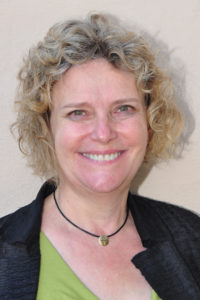I Am Starr King: Interview with Alexa Fraser
 What inspired you to become a religious leader?
What inspired you to become a religious leader?
I’ve been so moved and touched, and my heart has been so expanded by religious leaders that I knew that I wanted to be able to do the same for someone else. It was a long process of discernment. I had a twenty-eight year career— a very successful career in government contract research— and yet there was a gap on the spiritual side. A gap for me and a gap in what I could help others do. I came to know ministry as what I wanted to do.
Why did you decide to study at Starr King?
I have a Ph.D. I have I Master’s. I had a very academically vibrant career for, as I said, twenty-eight years. And I wanted to round out my growing edges. I did not want a cookie-cutter program. And it was clear to me that the Starr King program was the one that would give me the widest range or growth opportunities in the areas that I needed, while also completely complying with the Unitarian Universalist ordination requirements. Starr King is also an incredibly spiritual place and I love that about it.
You are an advocate for death with dignity. Can you describe the kind of work you are doing and why this is an important issue to you?
I have always been supportive of the idea of death with dignity. And let me just clarify what that means—that means that someone with a terminal diagnosis with less than six months to live can go through an extremely structured process with doctors’ approval, determination of psychological competency, and various hurdles and structures to make sure that nothing rash or inappropriate is ever done. Then they can get a prescription for medication that they can take that will end their life. So yes, I support that. And I have long supported that.
Recently I have been able to become more involved for a couple of reasons. I’m now an active volunteer with Compassion and Choices. One reason I am now more active is that my father took his own life after having his Parkinson’s lead to what was for him an impossible life. And while I say that he died of Parkinson’s, I also know that he died in a much more violent way than he otherwise would have. He no longer needed my help and he died violently at his own hand. Both of those are a part of my context.
Another part of my context — and I have never said this when I have been asked this question— another part of the reason I can now be active is Starr King. Because Starr King has taught me to consciously choose to promote social change as an important way of connecting to people. Death with dignity is an important way to reduce suffering and I want to do that work.
And last, but not least, Starr King gives tools that allow you to do profoundly painful and hard social action work with greater psychological safety. I say that because the school is teaching us about how to be deep agents of change in a troubled world while not being overwhelmed by the struggle. Starr King is teaching us how to care for others and still care for ourselves.
How is death with dignity a theological or religious issue?
I am excited that I will have a better answer to that in a couple of months than I do now. I’m taking a field course under Dr. Gabriella Lettini and Rev. Ralph Mero, a retired UU minister who has worked in this field for many years, to explore that. My goal is to figure out what a theology of death with dignity would really look like for me.
In the short term, I can say that our first principle of Unitarian Universalism ties to this. That principle speaks of the inherent worth and dignity of every person. Respecting someone’s choices as to how they die is certainly tied to the first principle. And it is about kindness… I mean really, because if we cannot give kindness what are we doing?
How is your work advocating for death with dignity part of your ministerial formation?
As I alluded to before, I think there is an important skill set, as well as confidence in that skill set, that you can do hard work and still be a happy, whole person. Or even a happier or more whole person. Starr King helps teach that—it is actually part of the curriculum.
And also there is just that precious gift of time. When I was working full time that took a lot out of me. Taking even one additional class took a lot out of me. I am the mother of a wonderful fifteen year old; I have a great partner; I am deeply involved in my church. And it takes time to build these skills, and being a full time student means now I have time to do that.
What do you hope to do with your Starr King education going forward?
It is too early to say. I know that I am extremely interested in congregational healing. I would very much like to work with congregations that are struggling over historic tensions and problems as they move toward being the beloved community that they have every right to be. I want to help with that.
Want to share your story? Send your story to communications@sksm.edu.